I have determined that this is the year that I do something about it, because if not now, when?
John French The British in India from Foundry Books.
This isn't just a great resource for the wargamer as it is absolutely chock full of information, but it's also a lovely book to just read. It's well laid out, engagingly written and physically a very nice book.
I've been cross referencing the information I have from the Tilson scenario book and relying on French when it contradicts Tilson.
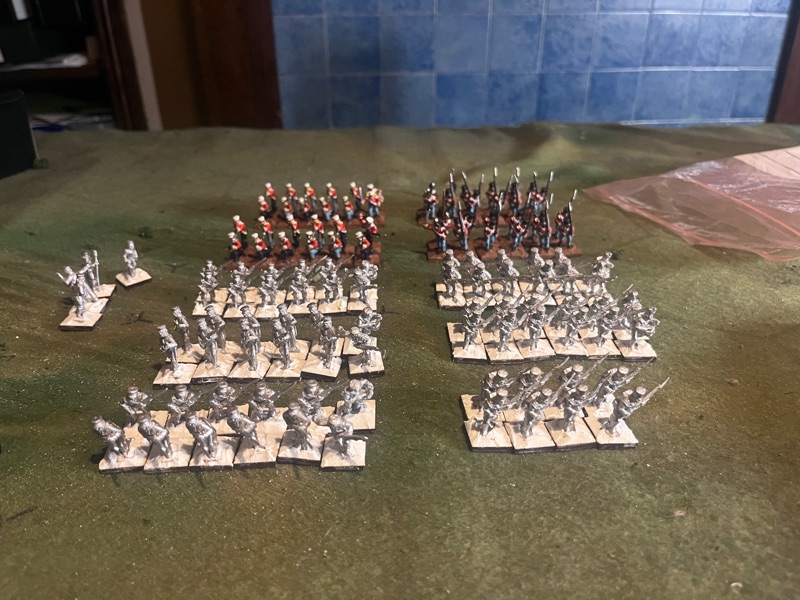
Newline Designs, with some added reinforcements from Nick Stern
Looking at the troops I need, I worked out what was required with reference to the Tim Tilson scenario collection for The Sword and the Flame. Tilson uses slightly smaller units, but I've bumped mine up to 12 figures per unit instead of eight, so that I can play the Tilson amendments or use the 12 figure units for The Men who would be Kings. In the event that I get to play The Sword at the Flame as written, I can stick two TMWWBK together to get one TSATF unit.
Looking at the British & Company infantry for the First Sikh War.
What I have in stock -
Two British infantry units in white forage caps with buff facings
Two BNI infantry units with green facings
Mudki
31st Foot (buff facing) 2 units - forage cap with black peak and white cover
50th Foot (blue facings) 1 unit - shako with white quilted cover
42nd Bengal Native Infantry (yellow facings) 1 unit
47th Bengal Native Infantry (yellow facings) 1 unit
48th Bengal Native Infantry (yellow facings) 1 unit
Ferozeshah
1st Bengal European Light Infantry (pale blue facings) 1 unit
29th Foot (yellow facings) 1 unit - forage cap with black peak and white cover
80th Foot (yellow facings) 1 unit - forage cap with black peak and white cover
26th Bengal Native Infantry (red facings) 1 unit
45th Bengal Native Infantry (dark green facings) 1 unit
41st Bengal Native Infantry (yellow facings) 2 units
Cornes' Convoy
This is a skirmish and requires four units of the 53rd Foot, which would involve quadrupling the number of units with red facings I would require. I'll bite the bullet and accept that the facings will be wrong for this particular engagement.
Action at Bhuderwal
There's an action here recorded in French (p.53 The British in India, Foundry books) that doesn't seem to have merited a scenario. I might look at that.
Aliwal
31st Foot (buff facings) 2 units - forage cap with black peak and white cover
50th Foot (blue facings) 2 units - shako with white quilted cover
24th Bengal Native Infantry (white facings) 1 unit
47th Bengal Native Infantry (yellow facings) 1 unit
48th Bengal Native Infantry (yellow facings) 1 unit
Sirmoor Gurkha Battalion (I don't have any of these, but Sean at Newline seems to have done just the right stuff, time for a small order I think).
Sobraon
10th Foot (yellow facings) 1 unit - bell topped shako white cover
80th Foot (yellow facings) 1 unit - forage cap with black peak and white cover
9th Foot (yellow facings) 1 unit - quilted cover on a dress shako
62th Foot (buff facings) 1 unit - forage cap with black peak and white cover with "havelock" curtain
43rd Bombay Native Infantry (pea green facings) 1 unit (seems to be Bengal NI)
59th Bombay Native Infantry (saxon green facings) 1 unit (seems to be Bengal NI)
33rd Bombay Native Infantry (black facings) 1 unit (seems to be Bengal NI)
63rd Bombay Native Infantry (yellow facings) 1 unit (seems to be Bengal NI)
26th Bengal Native Infantry (red facings) 1 unit
French doesn't list any troops from Bombay on his Sobraon order of battle, but all the right regimental numbers are there for Bengal troops, so I am assuming this is a typo on Tilson's part. The Bombay Native Infantry did serve in the Second Sikh War, so I'm assuming that this is were the mistake was made.
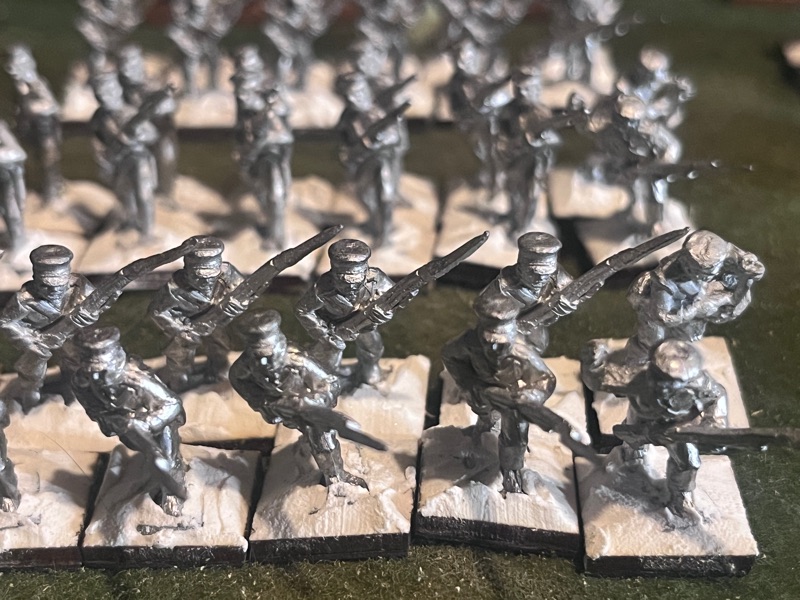
Newline's British infantry are all in these rather fetching peaked caps. However, one of the downfalls of having better information then when I started the project is that I know know that these figures are correct for some, in fact most, of the British infantry, they won't do for all.
When I started the project, I just saw British infantry and ordered some, not realising that different regiments would be wearing different headgear. Bah!
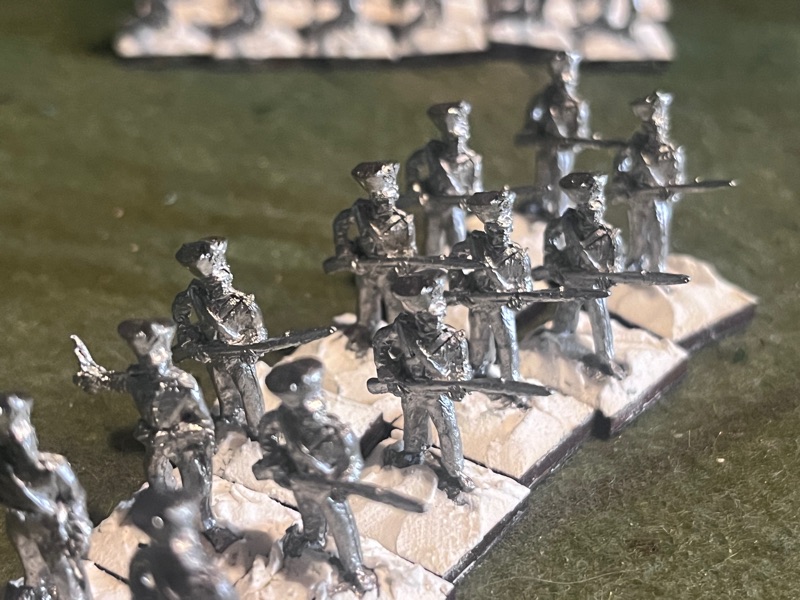
I was picking up some other stuff from Irregular when I saw that they had early 19th century British infantry in shakos. And didn't I remember that they didn't wear bell topped shakos during the Sikh War. Which will teach me to order miniatures late at night, when I may have had a few sherries.
UPDATE: It looks like the 10th (see below) were wearing Bell Topped shakos. Brilliant.
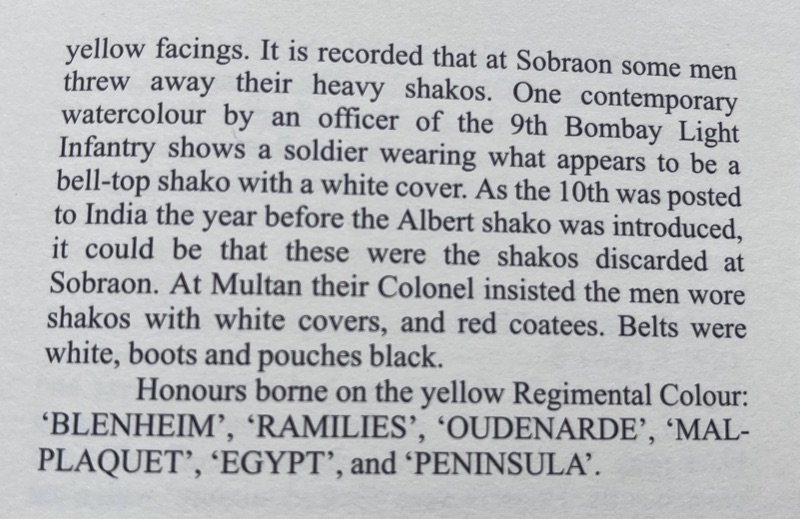
From French, The British in India. 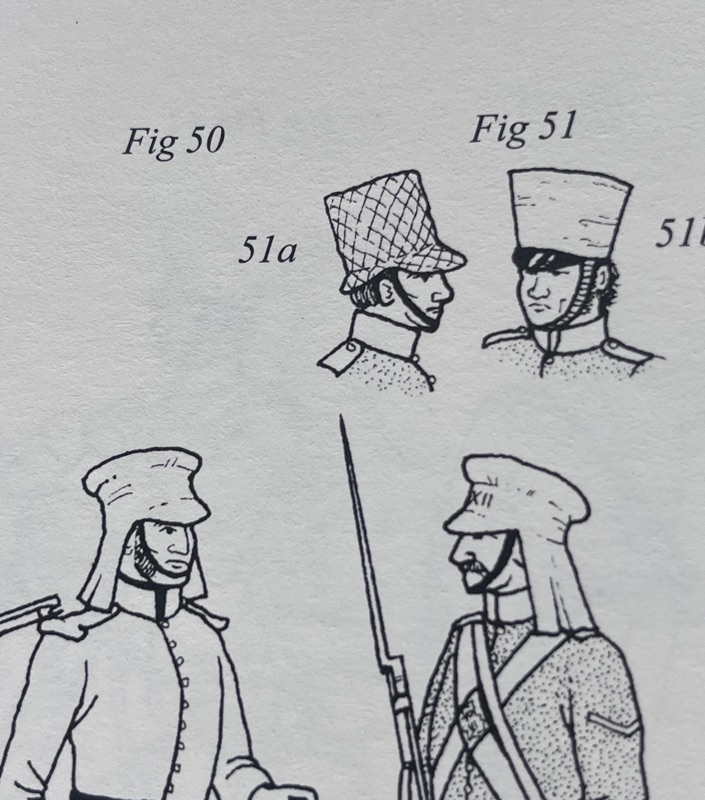
The variant headgear worn by the British infantry on this campaign. I think I should be able to do something with green stuff.
Reflecting on the problem, I think it would be folly to get every regiment. Most of the scenarios only deploy the units that were actually engaged, so the full order of battle isn't present in each engagement. That and the differences between them are not massive, so what I think I'll do is sort out my troops, working on the basis that so long as the headgear and the facing colour is correct (or near as damn, I'm not sure I'm that exercised about the difference between dark, saxon and pea green), they'll do. So I'll need to work out how many units of figures I will actually need.
Hopefully I won't have to wait until 2028 to do that.



































































